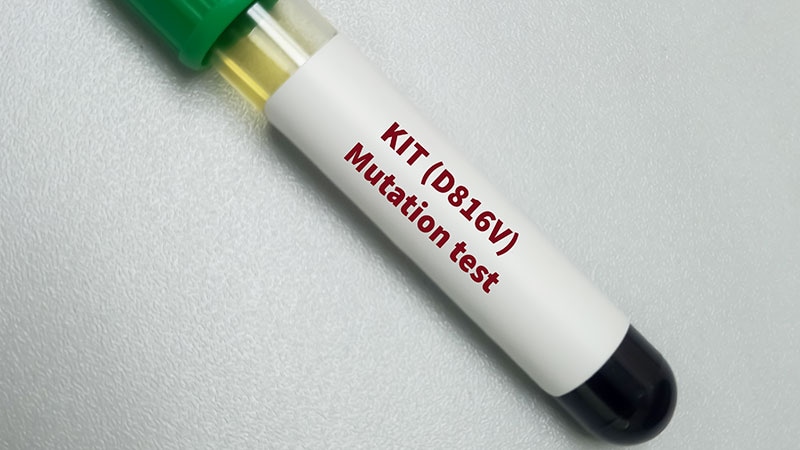Europe Approves Avapritinib for Indolent Systemic Mastocytosis
Core Concepts
Avapritinib is approved in Europe for treating indolent systemic mastocytosis, offering significant benefits to patients with the condition.
Abstract
The European Commission has approved avapritinib (Ayvakyt) for adult patients with indolent systemic mastocytosis (ISM) who are not adequately managed by current treatments. ISM is a rare blood disorder characterized by an abnormal build-up of mast cells in various organs, causing distressing symptoms. Avapritinib, a kinase inhibitor, targets the KIT D816V mutation in mast cells. The approval is based on data from the PIONEER trial, showing significant benefits in reducing symptoms and mast cell burden. Avapritinib has demonstrated efficacy and tolerability in treating moderate to severe ISM, with plans for commercial launch in Germany and other European countries.
Europe Approves Avapritinib for Rare Mast Cell Disease
Stats
ISM affects around 40,000 individuals in the European Union.
Avapritinib showed a significantly greater decrease in the total symptom score compared to placebo (15.6 vs 9.2 points).
Approximately 37% of patients experienced reductions of 50% or greater in total symptom score after 48 weeks of treatment.
Quotes
"Avapritinib offers significant benefits to patients with indolent systemic mastocytosis."
"The approval is grounded in data from the PIONEER trial, demonstrating the drug's efficacy."
Key Insights Distilled From
by Drishti Agar... at www.medscape.com 12-13-2023
https://www.medscape.com/viewarticle/europe-approves-avapritinib-rare-mast-cell-disease-2023a1000vb3
Deeper Inquiries
How does the approval of avapritinib impact the treatment landscape for rare diseases in Europe?
The approval of avapritinib marks a significant advancement in the treatment landscape for rare diseases in Europe, particularly for individuals with indolent systemic mastocytosis (ISM). As the first approved therapy for ISM in Europe, avapritinib provides a targeted treatment option for patients who are inadequately managed by current symptomatic treatments. This approval not only addresses the unmet medical need for individuals with ISM but also sets a precedent for the development and approval of therapies for other rare diseases in the region. By demonstrating the efficacy and safety of avapritinib in a rare disease setting, it paves the way for future research and development efforts focused on addressing other rare conditions that lack effective treatment options.
What potential challenges or limitations might arise from the use of avapritinib in treating indolent systemic mastocytosis?
While avapritinib represents a significant advancement in the treatment of indolent systemic mastocytosis (ISM), there are potential challenges and limitations that may arise from its use. One challenge is the potential for adverse events associated with avapritinib, despite its favorable safety profile. Patients may experience common side effects such as flushing, edema, increased blood alkaline phosphate, and insomnia, which could impact their quality of life and adherence to treatment. Additionally, the long-term effects of avapritinib in patients with ISM are still being evaluated, and further research is needed to assess its efficacy and safety over extended periods. Moreover, the cost of avapritinib treatment may pose a barrier to access for some patients, especially in regions where healthcare technology assessment and reimbursement timelines are stringent. Addressing these challenges will be crucial in maximizing the benefits of avapritinib therapy for individuals with ISM.
How can the success of avapritinib in treating ISM inform the development of treatments for other rare diseases?
The success of avapritinib in treating indolent systemic mastocytosis (ISM) can serve as a valuable blueprint for the development of treatments for other rare diseases. By targeting the key driver of ISM, the KIT D816V mutation in mast cells, avapritinib demonstrates the importance of precision medicine in rare disease therapeutics. This targeted approach can be applied to other rare diseases with specific genetic mutations or molecular pathways driving the disease process. Additionally, the clinical trial data from the PIONEER trial, which showed significant and clinically relevant benefits of avapritinib in patients with ISM, highlights the importance of rigorous research and evidence-based medicine in rare disease treatment development. The successful outcomes of avapritinib in improving disease symptoms and reducing the burden of pathologic mast cells can inform the design and implementation of clinical trials for other rare diseases, ultimately leading to the development of more effective and targeted therapies for these conditions.
0
